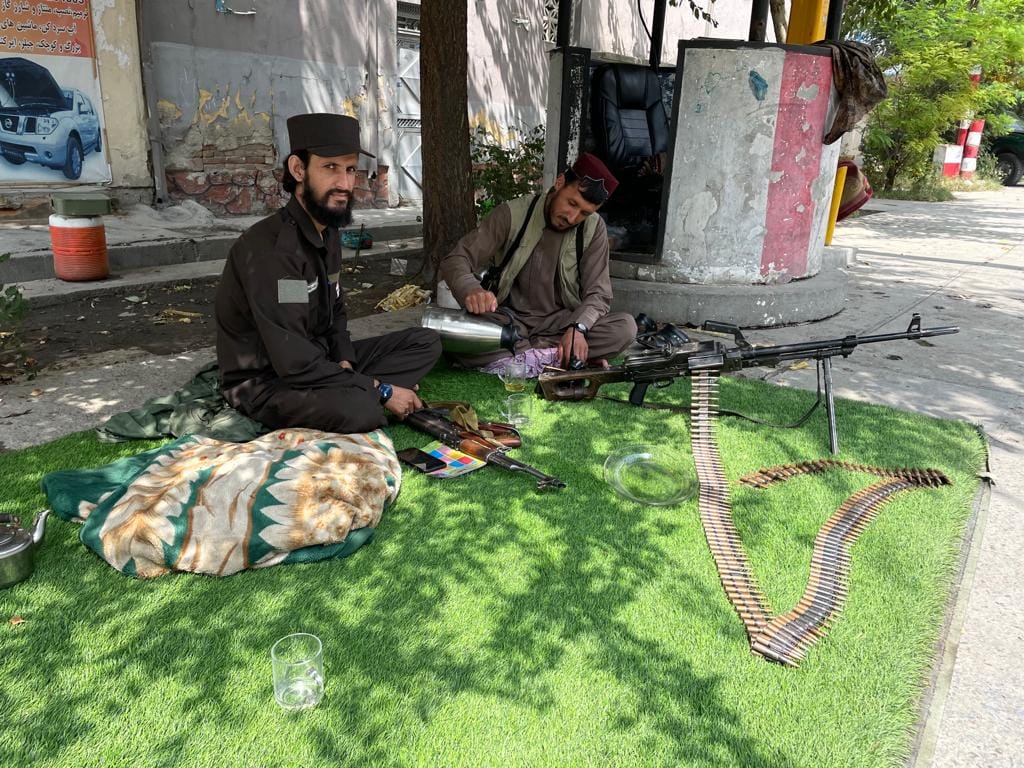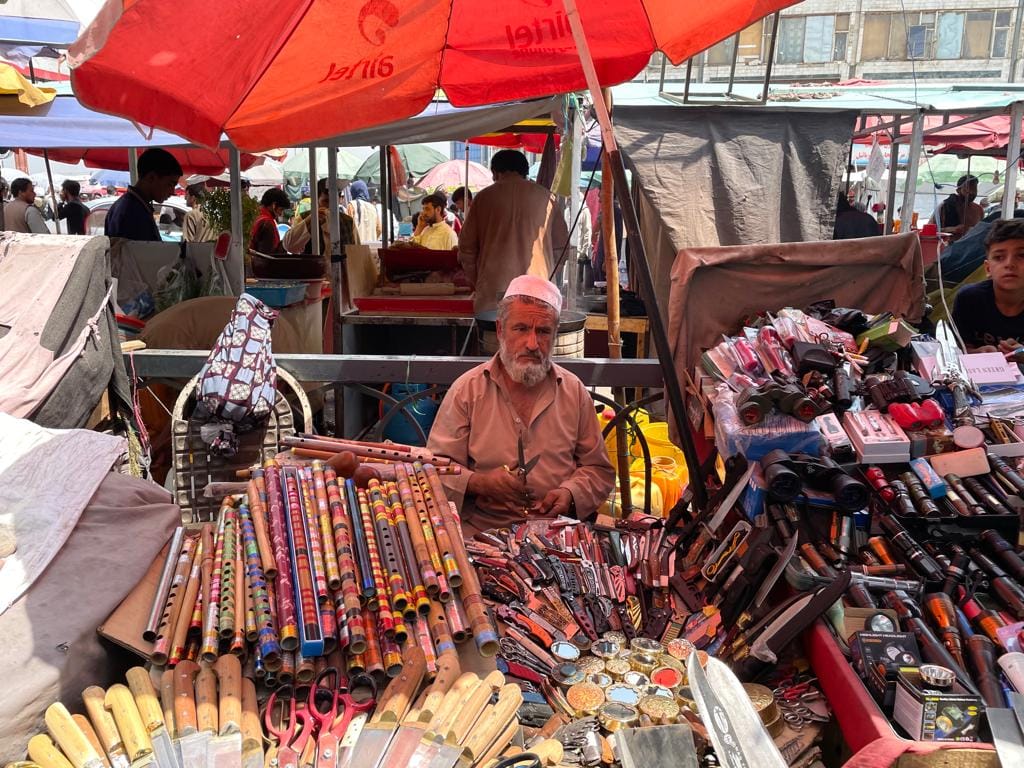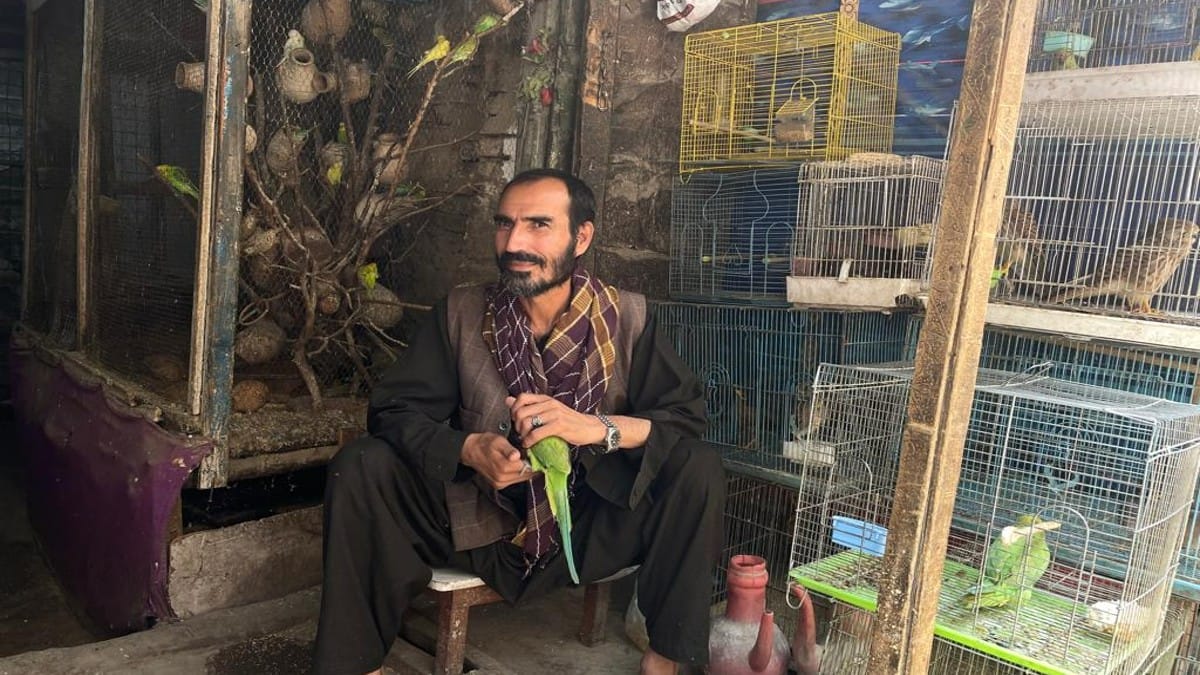Kabul: At the Kah Faroshi bird market in Kabul’s old city, the question of whether the ruling Taliban has become an improved version of itself turns on the question of what they think of the buying and selling of birds, if not outright gambling.
It’s Friday, the day of the week sacred to all Muslims worldwide — and the weekly off in Afghanistan — in deference to which the city has more or less shut down. Traffic to Kah Faroshi is slow. The muezzin calls at you more clearly. The Taliban are about, roaming the streets in their distinctive black-and-white turbans.
At one checkpoint in Sherpur, in the heart of the city, not far from where the al Qaeda chief Ayman al-Zawahiri was killed just two weeks ago, two young Talib are sitting on a plastic grass mat, drinking green tea, cradling their automatic guns, while a ribbon of bullets lies carefully unspooled in front.

This is their city and they know it. First, ask if you can take a few photos. Yes, a slight nod of the head. Second, ask if you can ask questions. Yes, okay, says Mustafa, 23, from nearby Wardak province, while Ahsanullah, 30, from Logar province, pours tea for his guests.
Mid-sip, Mustafa believes enough is enough. Please do not defile the plastic grass mat with your presence anymore. You have outlived your welcome. The foot-soldier’s fatwa is final.
My translator offers a second interpretation of the scene just played out. Taliban sudhar raha hai, he says. The Taliban is improving itself. Earlier, there would be absolutely no question of them allowing a foreign woman to address them in a public space.
A security guard from a nearby bank strolls up. He half-winks at us. “I have got my visa for Germany. I am leaving next month. Main jaa raha hoon.”
As the Taliban’s first anniversary in power on 15 August inches closer, the exodus from Afghanistan continues. According to UNHCR, as many as 683,000 people fled the country after the Taliban came to power a year ago, while another 239,000 are seeking asylum abroad.
But the truth is that more and more countries are coming around to the fact that you cannot ignore the Islamic Emirate of Afghanistan (IEA), even if the UN has refused to recognise it so far. As many as 14 countries have reopened their missions in the country, including India, which still calls its relatively small presence a “technical mission”. Diplomats say they are keenly watching the unpredictable security situation.
The big powers are all here, in one way or another. Russia and China never left, while the US continues to wield enormous power through its influential NGOs. Pakistan openly ramped up its presence and the Central Asian states followed suit. Iran and Tajikistan, neighbours on either end of Afghanistan, Turkey and the European Union, are all key players in town.
Also Read: Nameless airport, IS attack, Delhi paan, vanilla ice cream — Kabul, a year after Taliban return
Much has changed, much hasn’t
Two women who work for one such influential US NGO in Herat in western Afghanistan, point out that the Taliban’s worst failure lies in the manner in which they have dealt with women’s rights and freedoms this past year. Girls above Class 6 cannot go to school, university classes for men and women are separate as are office spaces where both sexes work, and public parks — including the world heritage site, the Bagh-e-Babur, where lies the grave of the first Mughal emperor, Babur — have been bifurcated into ‘mardana’ (men only) and ‘zenana’ (women only) sections.
The two out-of-town women notice how Kabuli women have become more conservative, wearing longer tunics, like women from Kandahar and Herat in the south and west.

One of the women has brought her father along; he is her ‘mahram,’ a family male escort who must accompany an adult woman if she’s travelling out of town, as decreed by the Islamic Emirate; her husband is busy all week. The other woman sought special permission from her office — which in turn is in constant touch with the local Taliban — to be exempt from the ‘mahram’ rule, because neither husband, nor brother or father, were available. The Taliban allowed her to travel alone.
Who pays for the ‘mahram’? The office, of course. So in the name of protecting an Afghan woman’s chastity, the Taliban has also decreed that the organisation in question picks up the tab for the ‘mahram’ too.
Both women also pointed out that Taliban rule had certainly improved security conditions; nobody dares mess with them. Earlier, in the time of the Islamic ‘jamhooriyat’, or republic, the infighting between warlords and pretenders in most provinces meant that women had to be much more careful when they left the house.
En route to Kah Faroshi, a big, fat Lexus SUV — without number plates — that costs at least $80,000, emits a few bars of melody, shattering the hot, morning silence. (It’s only the SUV reversing.) Music is banned by the Taliban, which means that the Kuch-e-Kharabat, where you could buy commonly loved musical instruments like tablas and sarangis, has been obliterated. ‘Afghan Star’, the beloved singing competition, has been banned. TV channels cannot showcase any music shows.
But the music has been pushed inside, behind closed doors. So you cannot sing and dance at weddings, but a DJ can do the honours. “When I drive home from work,” says IT technician Ahmad Shah, “I put the music on in my car. The Taliban really doesn’t care. It is a different Taliban from the last time around.”

At Asif’s bird stall in Kah Faroshi, an elderly buyer is negotiating the price of a “kowk”, a highly prized partridge with black-and-white feathers that he plonks into a deep cloth bag so that the bird has no chance for escape. The market is packed with men of all ages and all tribes — Pashtun and Tajik and Hazara and Turkmen and Uzbek, all notoriously individualistic outside the market, but consumed with an overriding passion for partridges, pigeons, parrots and other small and big birds that line the stalls on either side of this ancient market.

“The Taliban love birds too, after all they are Afghan,” says Asif, adding, “And for all those who say that there is a lot of poverty in Afghanistan after the Taliban came to power in this country, come here and see for yourselves. We love our birds. Yeh hamaara shauq hai. This is our passion. I don’t know what we love more.”
The deal is sealed at 4,000 Afghani, about Rs 3,500. Asif teases the buyer. “Yeh hamara Seth Dharam Das hai,” he laughs and everyone crowding into the stall laughs along. Hindi films are obviously still ubiquitous in these parts, despite two years of Covid and a near-complete ban on Indian visas for Afghans since the Taliban took power in Afghanistan a full year ago.
Last time around, when the Taliban ruled Afghanistan from 1996-2001, bird gambling was banned because all gambling was banned. This time around, at least for now, it seems as if the Taliban is taking a more lenient view of things. At least the Kah Faroshi bird market is applauding.
(Edited by Gitanjali Das)
Also Read: Afghan chess players hold Taliban flag in Chennai, shows ‘good relations’ with India says Kabul






